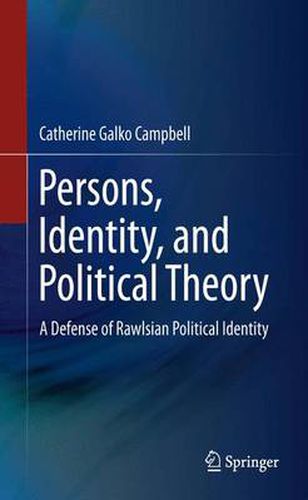Readings Newsletter
Become a Readings Member to make your shopping experience even easier.
Sign in or sign up for free!
You’re not far away from qualifying for FREE standard shipping within Australia
You’ve qualified for FREE standard shipping within Australia
The cart is loading…






This title is printed to order. This book may have been self-published. If so, we cannot guarantee the quality of the content. In the main most books will have gone through the editing process however some may not. We therefore suggest that you be aware of this before ordering this book. If in doubt check either the author or publisher’s details as we are unable to accept any returns unless they are faulty. Please contact us if you have any questions.
This book examines the conception of the person at work in John Rawls’s writings from Theory of Justice to Justice as Fairness: A Restatement. The book aims to show that objections to Rawls’s political conception of the person fail and that a Rawlsian conception of political identity is defensible. The book shows that the debate between liberals and communitarians is relevant to the current debate regarding perfectionism and neutrality in politics, and clarifies the debate between Rawls and communitarians in a way that will promote fruitful discussion on the issue of political identity. It does this by providing a clearer account of a conception of personal identity according to which persons are socially constituted, including the intuitions and assumptions underlying the communitarians’ conception of persons as socially constituted. It examines the communitarian objections to liberal political theory and to the liberal conception of persons, the unencumbered self. The book differentiates between two types of objection to the liberal conception of persons: the metaphysical and normative. It explains Rawls’s political conception of persons, and the metaphysical and normative commitments Rawls incurs-and does not incur-in virtue of that conception. It shows that both kind of objection to Rawls’s political conception of the person fail. Finally, modifying Rawls’s political conception of the person, a Rawlsian conception of political identity is explained and defended.
$9.00 standard shipping within Australia
FREE standard shipping within Australia for orders over $100.00
Express & International shipping calculated at checkout
This title is printed to order. This book may have been self-published. If so, we cannot guarantee the quality of the content. In the main most books will have gone through the editing process however some may not. We therefore suggest that you be aware of this before ordering this book. If in doubt check either the author or publisher’s details as we are unable to accept any returns unless they are faulty. Please contact us if you have any questions.
This book examines the conception of the person at work in John Rawls’s writings from Theory of Justice to Justice as Fairness: A Restatement. The book aims to show that objections to Rawls’s political conception of the person fail and that a Rawlsian conception of political identity is defensible. The book shows that the debate between liberals and communitarians is relevant to the current debate regarding perfectionism and neutrality in politics, and clarifies the debate between Rawls and communitarians in a way that will promote fruitful discussion on the issue of political identity. It does this by providing a clearer account of a conception of personal identity according to which persons are socially constituted, including the intuitions and assumptions underlying the communitarians’ conception of persons as socially constituted. It examines the communitarian objections to liberal political theory and to the liberal conception of persons, the unencumbered self. The book differentiates between two types of objection to the liberal conception of persons: the metaphysical and normative. It explains Rawls’s political conception of persons, and the metaphysical and normative commitments Rawls incurs-and does not incur-in virtue of that conception. It shows that both kind of objection to Rawls’s political conception of the person fail. Finally, modifying Rawls’s political conception of the person, a Rawlsian conception of political identity is explained and defended.